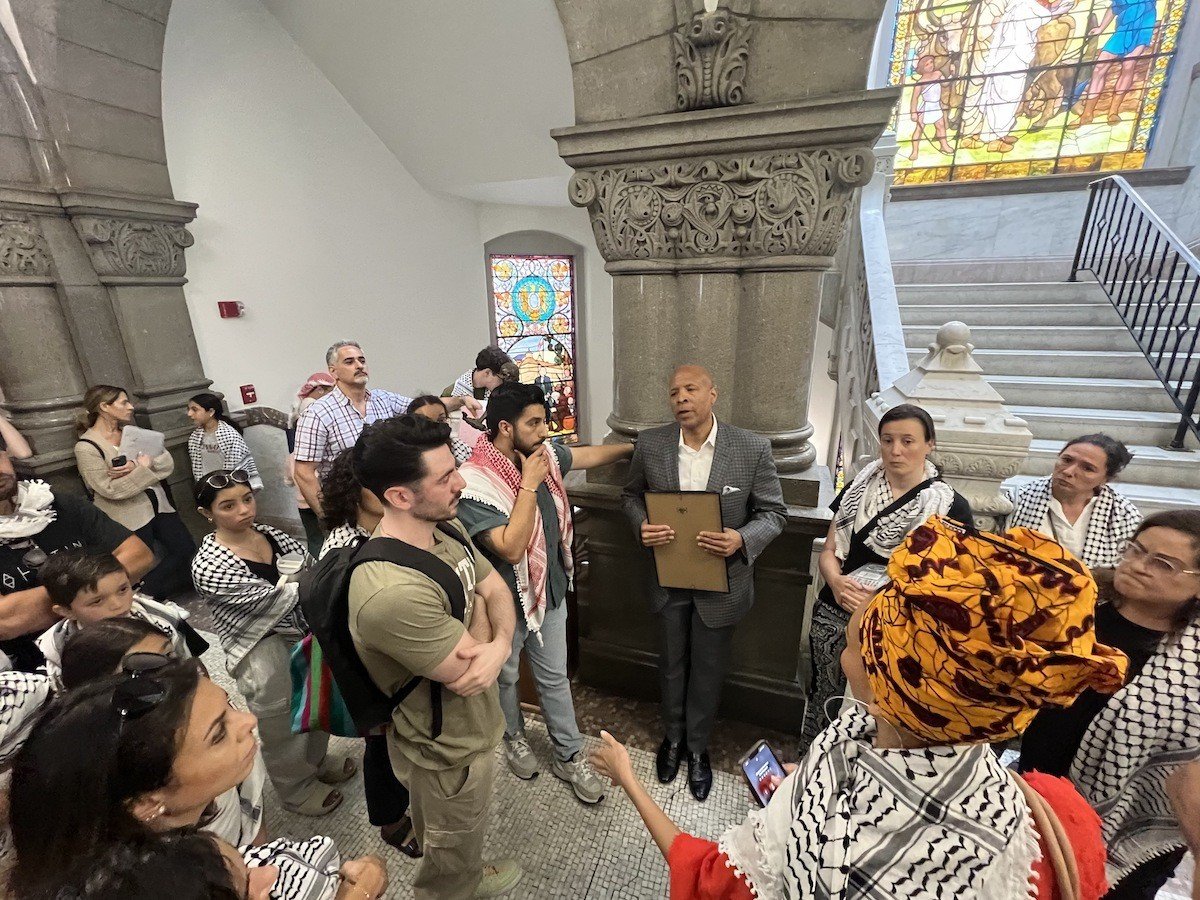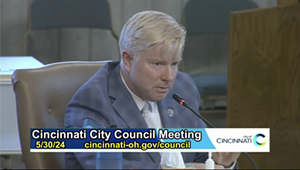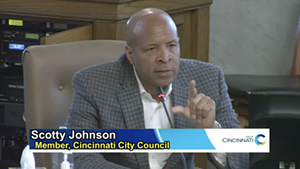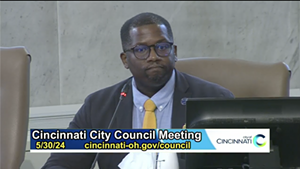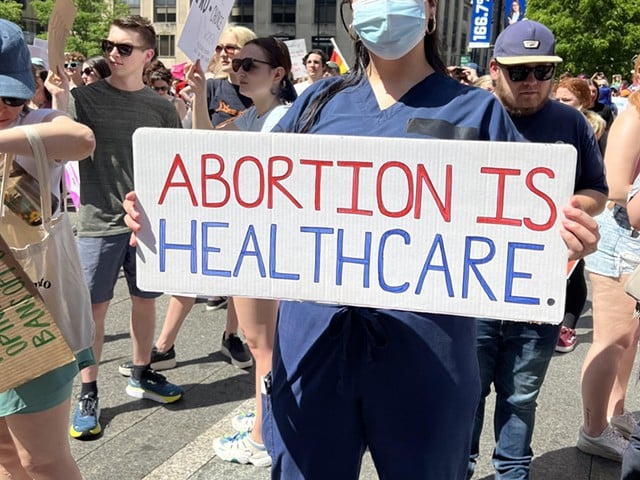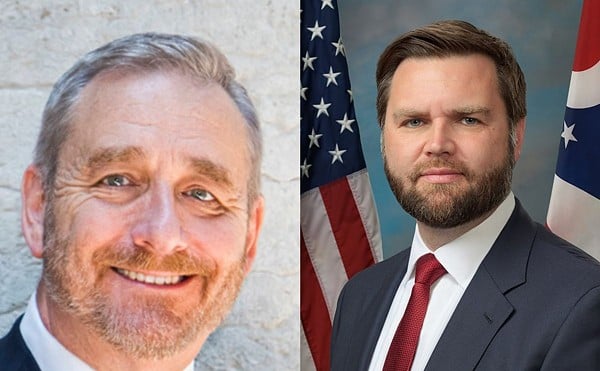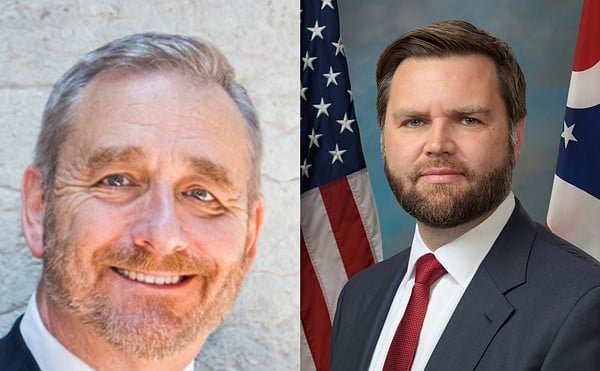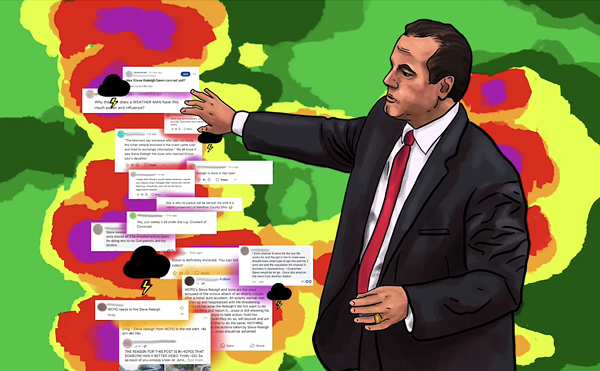Cincinnati City Council passed a resolution on May 30 recognizing World Keffiyeh Day in Cincinnati, but a single word’s amendment sparked arguments among members of council and the gallery.
Councilmember Scotty Johnson submitted the resolution with the help of Mike Madanat, a local advocate for Palestinians and member of the Cincinnati Palestine Solidarity Coalition. The resolution, as it was presented to council, was meant to recognize May 11 as World Keffiyeh Day in Cincinnati.
What is a keffiyeh?
The keffiyeh is a traditional Middle Eastern scarf that is commonly associated with Palestinian culture as a symbol of cultural identity, heritage and solidarity.
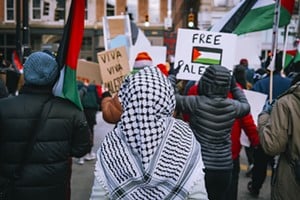
Photo: Aidan Mahoney
A protester wears a keffiyeh at a solidarity rally for Palestine held at Cincinnati's Ziegler Park on Jan. 13, 2023.
“The keffiyeh has three very distinct designs on it,” Madanat told CityBeat. “You have the long, bold lines that make up the trade routes throughout the Middle East, the trade routes that were used by Arabs. You have the olive leaves that signify the olive trees that are really important to the land, both for economic and also cultural representation. And then you have the fishnet, which is also the economical and importance of the sea that is really rich to the Palestinian people and their land.”
While keffiyehs have long been a symbol of Palestinian solidarity, their popularity has soared since Israel ramped up its military offensive in Gaza following the Oct. 7 terror attacks. As ethnically and religiously-motivated hate crimes and incidents in the U.S. have increased, including antisemitism, people wearing keffiyehs and other pro-Palestinian symbols have become targets.
In November, three college students of Palestinian descent, two of whom were wearing keffiyehs, were shot by a man while walking near the University of Vermont, according to Burlington Police. All three men survived the shooting but sustained serious injuries. The shooter, later identified by investigators as 48-year-old Jason J. Eaton, fled the scene and was later arrested. He pleaded not-guilty to three attempted murder charges, but the Department of Justice, along with Vermont authorities, are still investigating whether the shooting qualifies as a hate crime.
“Anything really that resembles Palestinian culture should not be identified with some form of terrorism, Madanat told CityBeat. “Even my experience of wearing a free Palestine t-shirt at the Flying Pig and being told that I'm a terrorist, you know, those types of things should not represent that – we should condemn those types of things. That's my hope with the resolution today.”
Read the entire original resolution below:
Read the entire original resolution below:
The one-word sticking point
The resolution addressed the cultural significance of the keffiyeh and the danger behind its misappropriation as a symbol of terrorism – all points members of council said they could get behind – but one word became a sticking point for Councilmember Mark Jeffreys.
“Since Oct. 7, people in the Palestinian community and in the Jewish community feel very vulnerable, very vulnerable. Our job as leaders is to lower the tension and not inflame them,” Jeffreys said. “There’s one particular word that I have a real issue with and I’ve had conversations with councilman Johnson and suggested a change, and that word is occupation."
Occupation is mentioned in one line of the resolution:
“World Keffiyeh Day is celebrated annually on May 11th in solidarity with Palestine, serving as an occasion to honor Palestinian culture and heritage and to raise awareness about the ongoing occupation faced by Palestinians."
Jeffreys goes on to point out that one of the speakers during the public comment portion of the meeting referenced Israel’s historical occupation of Palestine, which Jeffreys said can be interpreted as a call to eliminate the Jewish State.
“There is no qualifier to say the issue in Gaza, as one of the [public commenters] alluded, ‘76 years of occupation.’ For many people in the Jewish community that means River to the Sea, that means Israel doesn’t have a right to exist. Israel has a right to exist, and I will say that unequivocally,” Jeffreys said. “Essentially what we are doing is advocating for safety for one group while making another feel less safe.”
This is not the first time council has sparred over the language of a resolution about Israel-Palestine. On March 6, a resolution calling for a six-week ceasefire from council newcomer Anna Albi passed 7-1, while a resolution calling for a permanent ceasefire from Councilmember Meeka Owens failed 4-3, needing 5 to pass.
In light of Jeffreys' concern over the word occupation, Mayor Aftab Pureval asked Jeffreys if he would like to offer an amendment on the World Keffiyeh Day resolution.
“If he’s open to it,” Jeffreys responded.
Councilmember Johnson then responded to Jeffreys’ concerns over the word occupation.
“I don’t understand everything that’s going on, and I’ve been very honest in that,” he said. “I think the focus, though, this afternoon is addressing hate. It’s addressing the fact that people who chose to exercise the keffiyeh have been harassed, spit upon, killed, maimed.”
Johnson goes on to say that he is not “marginalizing Israel in any way shape or form” with the keffiyeh resolution, reminding council that he voted in favor of condemning Hamas’ Oct. 7 attack in the days that followed.
“Call me ignorant if you wish, but that is not my objective here this afternoon to marginalize or disenfranchise anybody,” Johnson said to applause from the gallery.
Councilmember Reggie Harris responded, suggesting the resolution was attempting to "[slip] in" a geopolitical stance.
“I have said this from day one with the ceasefire resolution…I do not want to comment on Middle East geopolitical work. I don’t want to. It has nothing to do with my work as a councilmember. And I feel, frankly, slipping this in manipulated [us] in having to sign off on a certain geopolitical stance,” Harris said. “I am not going to take a certain geopolitical stance.”
“You just did!” shouted several members of the gallery.
“This is not a call and response,” Harris responded.
Owens chimed in, saying she supports the resolution because of what she’s learned about the keffiyeh during her traveled upbringing.
“Someone actually took the time to educate me about [the keffiyeh] and so I appreciate that. This experience gave me a deeper and more profound understanding of Palestinian culture,” Owens said. “Anytime that we can uplift the beauty of people and their culture, this is truly elevating our shared humanity, [...] and that is my interpretation of this.”
Albi said she planned to vote for the resolution, but that she shared Jeffreys’ concerns over the use of the word occupation.
“I don’t want that getting in the way of me voting for a message that’s aimed towards combating stereotypes and incidents of hate,” Albi said. “Truly, more than anything, I want Cincinnati to be a safe place for all of us.”
After Albi’s comments, Johnson addressed the implication from Harris that geopolitics was slipped into the resolution to manipulate members into taking a stance on Palestine.
“Let me be crystal clear about something. I don’t do anything slipping, sliding, ducking and dodging. I’m as straightforward as they come. I don’t want anybody to think that’s listening or watching here that I attempted to slide anything forward without it being front and center. I don’t operate like that. I’m not in fear of any man on planet Earth that does it, I fear my lord and savior Christ and that’s it,” Johnson said.
Johnson said he was open to Jeffreys putting forth a motion to change the word occupation, but he didn’t vote for the amendment or the final resolution after the replacement word was put forth by Jeffreys.
“Plight,” Jeffreys offered instead. “Plight of the Palestinians."
The gallery swelled with disapproval. Pureval asked the crowd to stop yelling.
Pureval then held a vote on the amendment to change the word occupation to plight in the World Keffiyeh Day resolution.
Pureval then held a vote on the amendment to change the word occupation to plight in the World Keffiyeh Day resolution.
Councilmembers Johnson, Owens, Parks and Vice Mayor Jan-Michele Lemon Kearney all voted ‘No,’ while councilmembers Seth Walsh, Jeff Cramerding, Albi, Harris and Jeffreys voted ‘Yes’ on the amendment.
After again asking the gallery to quiet their shouts, Pureval called for a vote on the amended resolution where plight now replaced occupation. No one’s vote changed. The resolution passed without the support of its author and initial supporters.
Amid angry shouts from members of the gallery, Johnson, Madanat and dozens of pro-Palestinian gallery members once in support of the resolution filed into the hallway. Johnson held a framed copy of the resolution, the version that reads “...to raise awareness about the ongoing occupation faced by Palestinians.”
“At this point, there’s no reason to hand you this,” Johnson said to Madanat. “You asked for [the word] occupation. I tried to do exactly what you asked for.”
Madanat told CityBeat that, while the passed resolution lacks the acknowledgment of Israeli occupation, there's still a glimmer of it in the amended resolution.
“I believe [Jeffreys'] call to change the word 'occupation' to 'plight' says more about him than it does us or the Palestinian people," Madanat said. "[He] admitted that there is an injustice impacting Palestinians right now. He could have asked to strike the word all together, but he didn’t because he knows there’s an injustice being done to the Palestinian people. Now he can call it a plight and we can call it an occupation, but nonetheless, we both are referencing the same thing."
Follow CityBeat's staff news writer Madeline Fening on Instagram.

